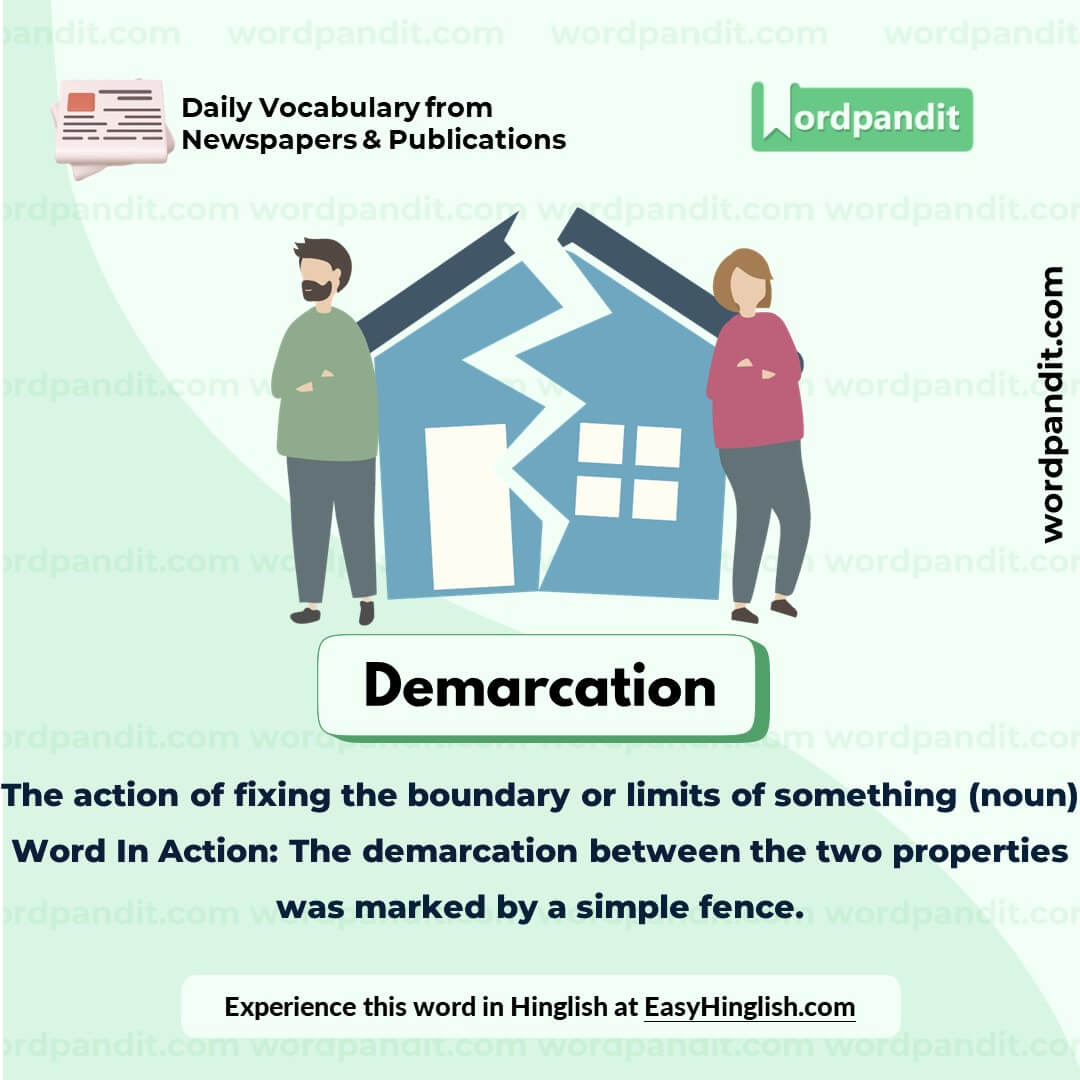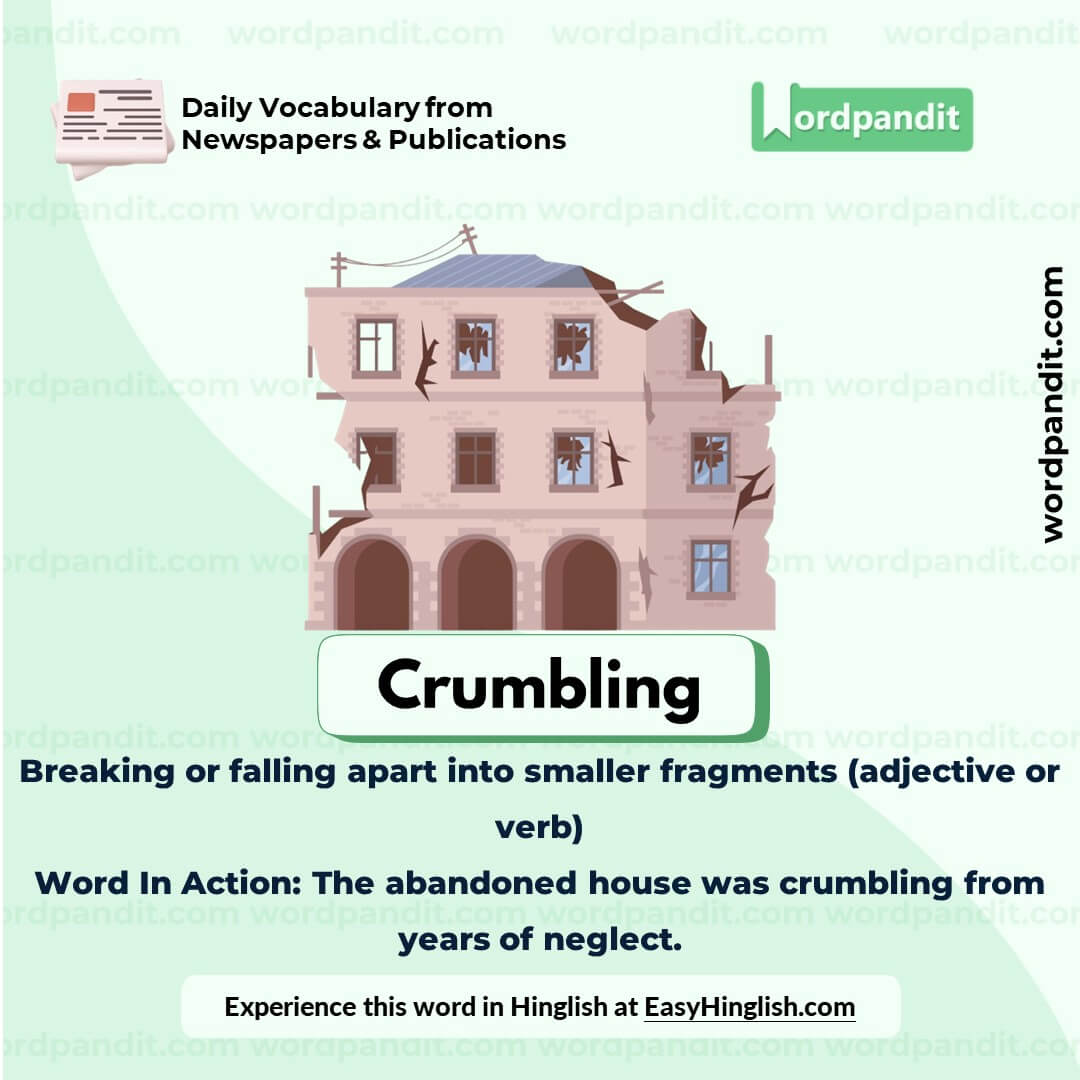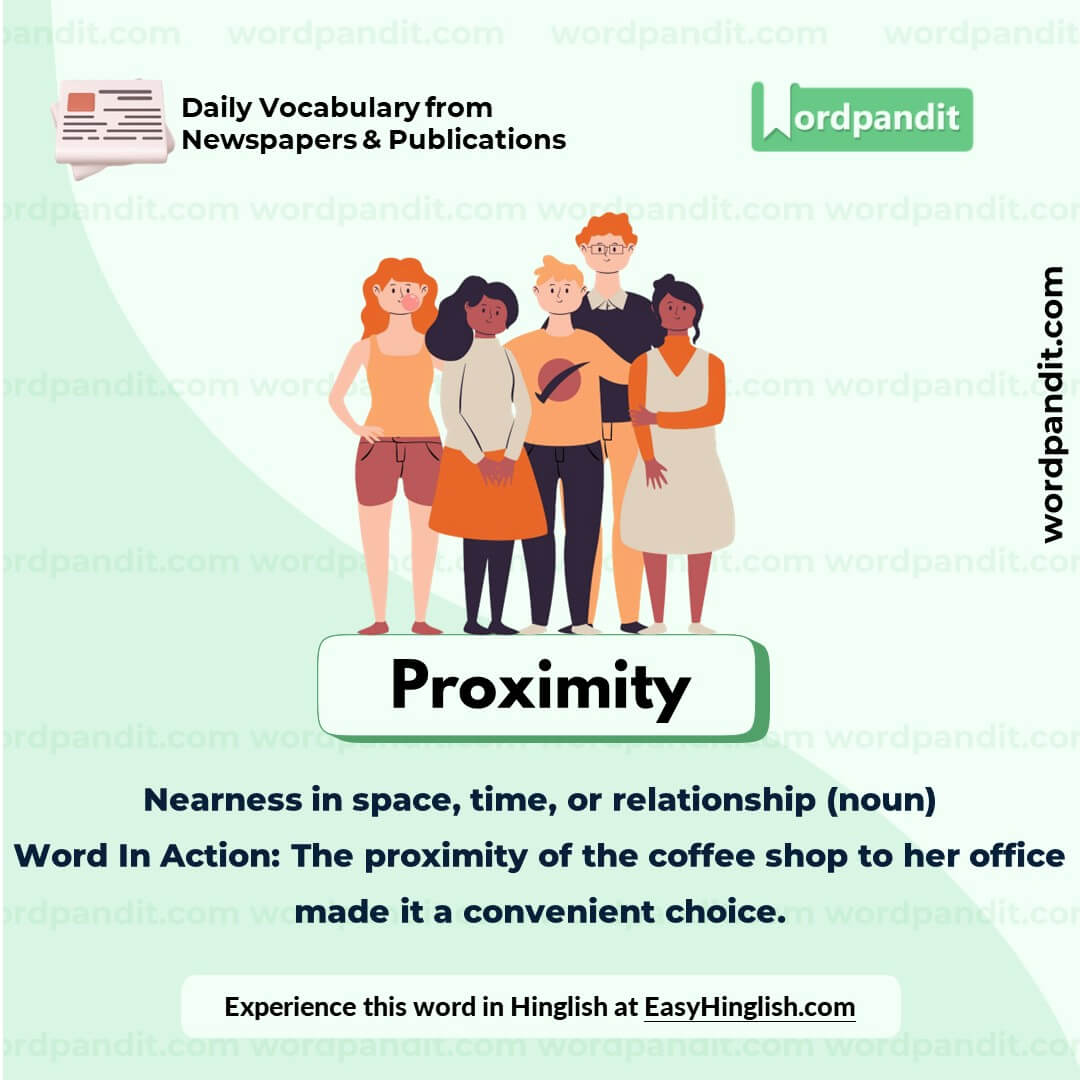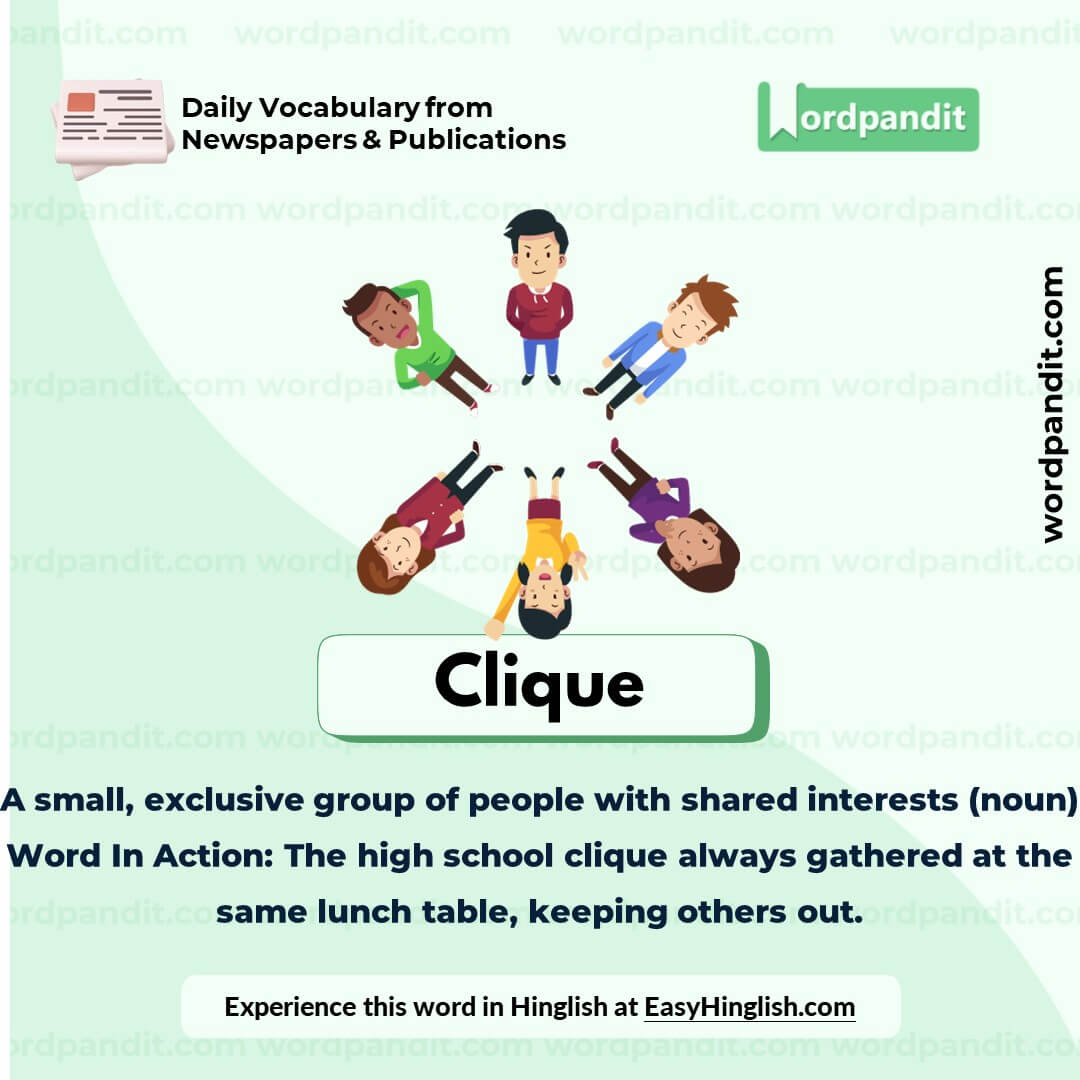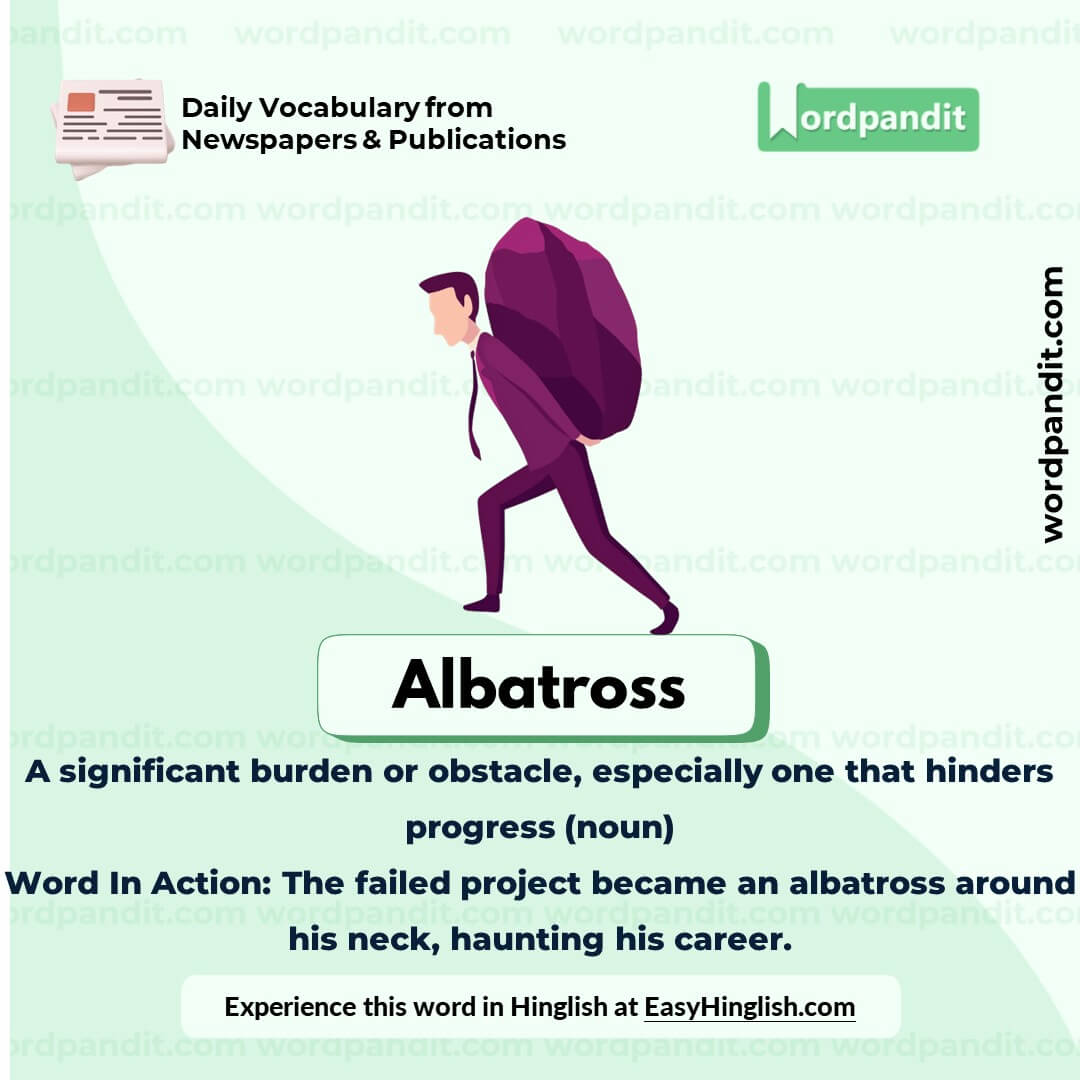Daily Vocabulary from Indian Newspapers and Publications
Welcome to Wordpandit’s Indian Vocabulary Hub
At Wordpandit, we understand the importance of staying rooted in the local context while expanding your language skills. This section focuses on enriching your vocabulary with words and phrases drawn from India’s leading newspapers and publications, ensuring you're learning vocabulary that is practical, relevant, and uniquely Indian.
Why Indian Sources Matter
We believe that the best way to master any language is by immersing yourself in local content. That’s why we carefully curate vocabulary from top Indian publications, including:
- The Hindu
- The Times of India
- The Economic Times
- Hindustan Times
- Live Mint
- The Indian Express
- And many others...
Stay Updated, Stay Relevant
With daily updates from Indian news sources, you’ll be consistently learning words that reflect the trends and shifts in Indian society and culture. Our focus is to provide vocabulary that enhances your understanding of the language in an Indian context.
How Wordpandit Supports Your Goals
Whether you’re preparing for exams, aiming to improve your professional communication, or simply want to stay connected with the latest Indian vocabulary, Wordpandit is here to guide you every step of the way.
Learn with a Practical Approach
Our interactive learning methodology includes real-world examples, engaging activities, and context-specific usage to ensure that every word becomes part of your active vocabulary.
Dive into Indian Vocabulary Today!
Why Choose Wordpandit?
Practical Learning: Focus on words you'll actually encounter in real-world reading, enhancing your comprehension and communication skills.
Diverse Content: From current affairs to scientific breakthroughs, our varied sources expose you to vocabulary across multiple domains.
Effortless Integration: Make Wordpandit a part of your daily routine. Just a few minutes each day can significantly boost your lexicon over time.
Your Path to Vocabulary Mastery
- Visit our Daily Vocabulary section regularly
- Explore new words and their usage in context
- Practice incorporating these words into your own writing and speech
- Track your progress as your vocabulary expands
Start Your Journey Today
Embark on your vocabulary enhancement journey with Wordpandit. By consistently engaging with our daily posts, you'll build a robust vocabulary that serves you well in academic, professional, and personal contexts.
Remember, a word a day keeps linguistic limitations at bay. Make Wordpandit your daily companion in the quest for vocabulary excellence!
WORD-1: Demarcation
Context:
"The national interest demands that our political leaders make a demarcation between collective well-being and an individual businessman’s legal difficulties." - The Wire
Explanatory Paragraph:
The term demarcation refers to the act of setting boundaries or making distinctions between two or more concepts, areas, or entities. It is often used in contexts where clarity or separation is necessary to avoid overlap or confusion.
Meaning: The action of fixing the boundary or limits of something (noun)
Pronunciation: dee-mahr-KAY-shuhn
Difficulty Level: ⭐⭐⭐ (Intermediate)
Etymology: From Latin demarcare, meaning "to mark out," with roots in Spanish and French usage.
Synonyms & Antonyms:
Synonyms: boundary, separation, distinction, division, limit
Antonyms: union, overlap, amalgamation, connection
Usage Examples:
- The treaty established a clear demarcation between the territories of the two nations.
- There is often a thin line of demarcation between professional and personal relationships in the workplace.
- The artist used a bold color palette to create a strong demarcation between light and shadow.
- The demarcation of voting districts is often a contentious political issue.
Cultural Reference:
The term "line of demarcation" became famous during the Age of Exploration, referring to the division of newly discovered lands between Spain and Portugal as decreed by the Pope in the Treaty of Tordesillas (1494).
Think About It:
Why is it important to have clear demarcations in law, politics, or science? What happens when boundaries are ambiguous?
Quick Activity:
Draw a diagram showing the demarcation between two concepts, such as work-life balance or rural and urban areas.
Memory Tip:
Think of "demarcation" as "marking the division" to remember its meaning of establishing boundaries.
Real-World Application:
The concept of demarcation is widely used in areas like urban planning, law, and international relations to clarify responsibilities, jurisdictions, and boundaries.
WORD-2: Crumbling
Context:
"In the current crumbling world order, the law is rarely able to bring globally powerful tycoons to heel." - The Wire
Explanatory Paragraph:
The word crumbling refers to the process of falling apart, breaking into smaller pieces, or losing strength and structure. It is often used metaphorically to describe systems, relationships, or structures that are deteriorating or failing.
Meaning: Breaking or falling apart into smaller fragments (adjective or verb)
Pronunciation: KRUM-bling
Difficulty Level: ⭐⭐ (Beginner-Intermediate)
Etymology: Derived from Middle English crumlen, meaning "to break into crumbs," with roots in the word "crumb."
Synonyms & Antonyms:
Synonyms: deteriorating, decaying, breaking, collapsing, disintegrating
Antonyms: stable, sturdy, intact, robust, solid
Usage Examples:
- The abandoned castle stood as a symbol of a crumbling past.
- Her crumbling confidence made it difficult for her to continue with the presentation.
- The infrastructure in the city is crumbling due to years of neglect.
- With the company’s finances crumbling, many employees were laid off.
Cultural Reference:
The phrase "crumbling empire" is often used in historical and political discourse to describe the decline of once-powerful nations, such as the fall of the Roman Empire in the 5th century CE.
Think About It:
What factors contribute to the crumbling of institutions or relationships, and how can they be restored or strengthened?
Quick Activity:
Write a short paragraph describing a metaphorical "crumbling" you have witnessed or read about, such as a declining institution or a fragile relationship.
Memory Tip:
Think of "crumbling" as "crumb-like," emphasizing the idea of something breaking into small, weak pieces.
Real-World Application:
The word "crumbling" is often used in journalism and literature to depict decay, such as in describing aging buildings, failing economies, or declining social structures.
WORD-3: Proximity
Context:
"Everyone is aware of the proximity between Gautam bhai and the ruling clique in New Delhi. Some would even venture to suggest a mutually advantageous interdependency between the Modi political project and the Adani empire." - The Wire
Explanatory Paragraph:
The word proximity refers to the state of being close to someone or something, either in terms of physical distance or abstract connection. It often highlights closeness that can lead to influence, interaction, or association.
Meaning: Nearness in space, time, or relationship (noun)
Pronunciation: prok-SIM-ih-tee
Difficulty Level: ⭐⭐ (Beginner-Intermediate)
Etymology: From Latin proximitas, meaning "nearness," derived from proximus, meaning "nearest."
Synonyms & Antonyms:
Synonyms: closeness, nearness, adjacency, vicinity, contiguity
Antonyms: distance, remoteness, separation, detachment
Usage Examples:
- The proximity of the school to their home was the deciding factor for their enrollment.
- Her proximity to the decision-makers gave her significant influence in the project.
- The proximity of the two planets during the celestial event made for a stunning view.
- The restaurant's proximity to the train station made it a popular choice for travelers.
Cultural Reference:
The concept of proximity is often explored in social psychology, such as in the "mere-exposure effect," which suggests that people tend to develop a preference for things or individuals they are frequently near.
Think About It:
How does proximity, whether physical or relational, influence trust and collaboration in personal or professional settings?
Quick Activity:
List three examples of how proximity has positively or negatively affected relationships or outcomes in your life.
Memory Tip:
Think of "proximity" as "approximately close" to remember its association with nearness.
Real-World Application:
The word "proximity" is commonly used in discussions about urban planning, interpersonal relationships, and technology, such as in proximity sensors or proximity marketing.
WORD-4: Clique
Context:
"Everyone is aware of the proximity between Gautam bhai and the ruling clique in New Delhi. Some would even venture to suggest a mutually advantageous interdependency between the Modi political project and the Adani empire." - The Wire
Explanatory Paragraph:
The word clique refers to a small, exclusive group of people who often share similar interests or backgrounds. This group tends to form a closed circle that may exclude others, sometimes giving it a reputation for being elitist or secretive.
Meaning: A small, exclusive group of people with shared interests (noun)
Pronunciation: kleek (in British English) or klik (in American English)
Difficulty Level: ⭐⭐ (Beginner-Intermediate)
Etymology: From French clique, meaning "a small group of people," first used in the 18th century.
Synonyms & Antonyms:
Synonyms: faction, cabal, coterie, inner circle, gang
Antonyms: community, coalition, collective, general assembly
Usage Examples:
- The clique of senior executives often made decisions without consulting the rest of the team.
- She felt left out because the class was dominated by a clique of popular students.
- The small clique of scientists worked tirelessly on the groundbreaking discovery.
- Critics accused the political clique of prioritizing their own interests over the nation's well-being.
Cultural Reference:
In literature and media, cliques are often portrayed in school settings, such as the "Plastics" clique in the movie Mean Girls, highlighting the dynamics of exclusivity and influence.
Think About It:
How can cliques be both beneficial and harmful in social, professional, or political environments?
Quick Activity:
Write a short story about a clique, showing its impact on the members within it and those excluded from it.
Memory Tip:
To remember "clique," think of "click" as a group that sticks together, forming a "closed click."
Real-World Application:
The term "clique" is often used in discussions about workplace culture, social hierarchies, and political groups to describe exclusivity and the dynamics of power.
WORD-5: Albatross
Context:
"The opposition, led by the Congress, will want to make him an albatross around Narendra Modi’s neck. On the other hand, no one should underestimate the ruling clique’s combative skills and political innovativeness in wanting to firewall the prime minister from Adani’s trouble with US law." - The Wire
Explanatory Paragraph:
The word albatross is often used metaphorically to describe a burden or source of persistent difficulty or guilt. Its origin lies in literature, particularly in Samuel Taylor Coleridge’s poem The Rime of the Ancient Mariner, where an albatross around the neck symbolized a heavy moral or spiritual burden.
Meaning: A significant burden or obstacle, especially one that hinders progress (noun)
Pronunciation: AL-buh-tros
Difficulty Level: ⭐⭐⭐ (Intermediate)
Etymology: From the Portuguese word alcatraz, referring to a seabird, later popularized in English through Coleridge’s poem.
Synonyms & Antonyms:
Synonyms: burden, millstone, hindrance, encumbrance, obstacle
Antonyms: advantage, asset, blessing, aid, support
Usage Examples:
- The company’s outdated policies have become an albatross, hindering its ability to adapt to modern practices.
- Her past mistakes, like an albatross, weighed heavily on her as she tried to move forward.
- The massive debt was an albatross around the entrepreneur’s neck, limiting their ability to expand the business.
- The controversial decision proved to be an albatross for the politician, drawing constant criticism.
Cultural Reference:
In Samuel Taylor Coleridge’s poem The Rime of the Ancient Mariner, the albatross symbolizes a curse and a burden after the mariner kills the bird, bringing misfortune to his ship.
Think About It:
Why do you think burdens or difficulties are often described metaphorically in literature and language? What does this reveal about human expression?
Quick Activity:
Write a short paragraph about a situation where you overcame an "albatross" in your life or career.
Memory Tip:
Remember "albatross" by associating it with "always a burden" to recall its metaphorical meaning of a persistent problem.
Real-World Application:
The term "albatross" is commonly used in journalism, politics, and literature to describe significant challenges or liabilities that hinder success or progress.


